Bij de Vierde Advent
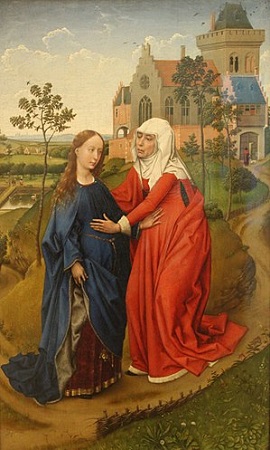
Mariae Heimsuchung
Noch erging sie’s leicht im Anbeginne,
doch im Steigen manchmal ward sie schon
ihres wunderbaren Leibes inne, –
und dann stand sie, atmend, auf den hohn
Judenbergen. Aber nicht das Land,
ihre Fülle war um sie gebreitet;
gehend fühlte sie: man überschreitet
nie die Größe, die sie jetzt empfand.
Und es drängte sie, die Hand zu legen
auf den andern Leib, der weiter war.
Und die Frauen schwankten sich entgegen
und berührten sich Gewand und Haar.
Jede, voll von ihrem Heiligtume,
schützte sich mit der Gevatterin.
Ach der Heiland in ihr war noch Blume,
doch den Täufer in dem Schooß der Muhme
riß die Freude schon zum Hüpfen hin.
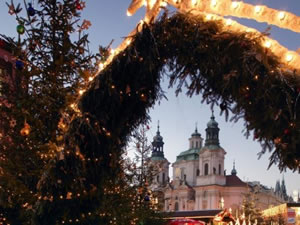
Rilke werd geboren in Praag (Hier de Staroměstské náměsti en Nicolaaskerk)
De Amerikaanse dichter en schrijver Robert Bly werd geboren op 23 december 1926 in Madison, Minnesota. Zie ook alle tags voor Robert Bly op dit blog.
Driving my Parents Home at Christmas
As I drive my parents home through the snow
their frailty hesitates on the edge of a mountainside.
I call over the cliff
only snow answers.
They talk quietly
of hauling water of eating an orange
of a grandchild’s photograph left behind last night.
When they open the door of their house they disappear.
And the oak when it falls in the forest who hears it through miles and miles of silence?
They sit so close to each other¡as if pressed together by the snow.
Surprised by Evening
There is unknown dust that is near us
Waves breaking on shores just over the hill
Trees full of birds that we have never seen
Nets drawn with dark fish.
The evening arrives; we look up and it is there
It has come through the nets of the stars
Through the tissues of the grass
Walking quietly over the asylums of the waters.
The day shall never end we think:
We have hair that seemed born for the daylight;
But at last the quiet waters of the night will rise
And our skin shall see far off as it does under water.
Driving to Town Late to Mail a Letter
It is a cold and snowy night. The main street is deserted.
The only things moving are swirls of snow.
As I lift the mailbox door I feel its cold iron.
There is a privacy I love in this snowy night.
Driving around I will waste more time.
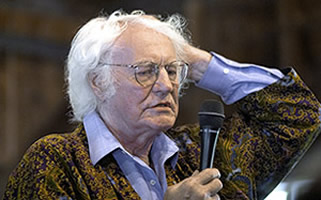
De Amerikaanse schrijver Norman Fitzroy Maclean werd geboren op 23 december 1902 in Clarinda, Iowa. Zie ook alle tags voor Norman Maclean op dit blog.
Uit: A River Runs Through It
„Then, since it is natural for man to try to attain power without recovering grace, he whips the line back and forth making it whistle each way, and sometimes even snapping off the fly from the leader, but the power that was going to transport the little fly across the river somehow gets diverted into building a bird’s nest of line, leader, and fly that falls out of the air into the water about ten feet in front of the fisherman. If, though, he pictures the round trip of the line, transparent leader, and fly from the time they leave the water until their return, they are easier to cast. They naturally come off the water heavy line first and in front, and light transparent leader and fly trailing behind. But, as they pass overhead, they have to have a little beat of time so the light, transparent leader and fly can catch up to the heavy line now starting forward and again fall behind it; otherwise, the line starting on its return trip will collide with the leader and fly still on their way up, and the mess will be the bird’s nest that splashes into the water ten feet in front of the fisherman.
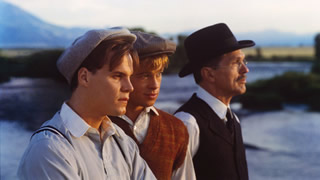
Almost the moment, however, that the forward order of line, leader, and fly is reestablished, it has to be reversed, because the fly and transparent leader must be ahead of the heavy line when they settle on the water. If what the fish sees is highly visible line, what the fisherman will see are departing black darts, and he might as well start for the next hole. High overhead, then, on the forward cast (at about ten o’clock) the fisherman checks again”
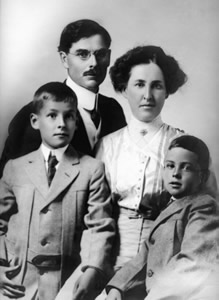
Maclean met zijn gezin
De Franse dichter, schrijver en essayist Marcelin Pleynet werd geboren op 23 december 1933 in Lyon. Zie ook alle tags voor Marcelin Pleynet op dit blog.
Uit: Comme la poésie la peinture
“Il faut relire les Lettres à Lou, qui ne figurent pas dans les OEuvres complètes, mais que l’on peut trouver dans la collection « L’Imaginaire » aux éditions Gallimard, et se demander quelle sorte de puritanisme poétique s’est employée à gérer l’oeuvre d’Apollinaire. Un puritanisme qui fera école (pour ne pas dire loi) dans l’histoire de la poésie du xx e siècle, et qui, n’en doutons pas, est à l’origine d’un grand nombre de jugements sur l’oeuvre d’Apollinaire.
Apollinaire et les femmes… Importance des Lettres à Lou, si l’on veut clarifier ce qui se joue dans l’oeuvre et dans la biographie du poète : pas clair, mais justement… Apollinaire et les femmes : Annie Playden (1901-1904) l’écarte et part finalement pour l’Amérique. Marie Laurencin (une invention de Picasso ?), 1907, elle le quitte en 1912. Louise de Coligny-Châtillon, 1914, « Lou », ils passent une semaine ensemble et elle le quitte. Imposante et importante correspondance. Ils continueront à s’écrire jusqu’en 1916. Épisode de Madeleine Pagès, en 1915, il entretient encore une correspondance avec Louise de Coligny. Il abandonne Madeleine peu après avoir été blessé à la guerre, en 1916. 2 mai 1918, mariage avec Jacqueline Kolb. Apollinaire meurt sept mois plus tard. Les spécialistes nous disent que « la femme du poète » « sut veiller avec un soin vigilant sur son patrimoine artistique et intellectuel ». Est-ce en refusant l’hommage que Picasso (sans doute toujours trop « sulfureux » – trop vrai – aux yeux de « la femme du poète » et de ses amis) voulait rendre à Apollinaire ?”

In Shanghai, 1974
De Britse schrijver Tim Fountain werd geboren op 23 december 1967 in Dewsbury, West Yorkshire. Zie ook alle tags voor Tim Fountain op dit blog.
Uit: Icons: Quentin Crisp
When I returned to London to write the play, I watched the video recording of our conversation. I reached the conclusion that despite his assertion that he only said things because he meant them there was often an elaborate double and treble bluff at play in the conversation. Did he mean it when he said he wished he’d had a sex change (“had you-know-what chopped off, become a woman and opened a knitting shop in Carlisle”) or was he actually satirising the idea? Often, the more outrageous his opinions were the more he turned up a naughty twinkle in his eye that seemed to ask: “Do you believe me?”
I came to the conclusion that what Crisp hated was orthodoxy of any kind. Perhaps he had spent so long as an outsider that he instinctively rejected membership of any club that would have him as a member – and that was perhaps why I was drawn to him? I started to realise that these contradictions in his character, these different people doing battle inside his bouffanted head, were what made him so interesting. At times he appeared conservative, at others a left-wing radical. He was both an icon and iconoclast, cheerfully laying into Oscar Wilde for his “sordid life”. He simultaneously struggled to belong and yet always distanced himself from getting too close to people, always addressing them as “Miss” or “Mr”, even “Mr God” or “Mr Sting” – the latter who wrote the hit song Englishman In New York about him. In short, he was a great, glittering contradiction.
But I couldn’t help feel his life had been a triumph. The sissy from the suburbs ended his life as one of the iconic figures of the late 20th century and left behind him an essence so distinct that, like Oscar Wilde and Noel Coward before him, his very name conjures up an attitude to and philosophy for dealing with the business of living.”
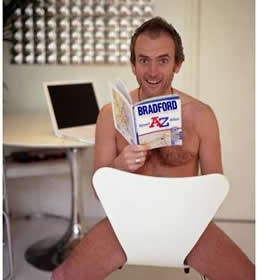
Zie voor nog meer schrijvers van de 23e december ook mijn vorige blog van vandaag en eveneens mijn eerste blog van vandaag.
